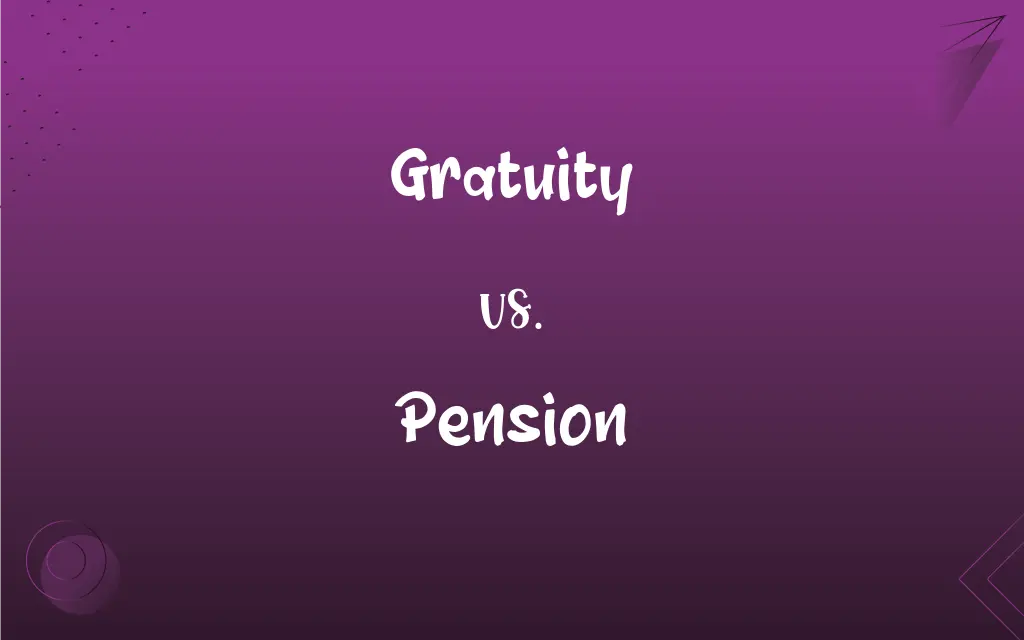Gratuity vs. Pension: What's the Difference?
Edited by Aimie Carlson || By Harlon Moss || Updated on October 20, 2023
Gratuity is a lump-sum payment given as a token of appreciation, usually at the end of employment, while a pension is a regular payment made to retirees, often monthly.

Key Differences
Gratuity and pension, though both related to employment benefits, serve different purposes. Gratuity is a one-time payment made to employees as a gesture of thanks for their service, usually when they exit a company after a certain period of service. This benefit is often calculated based on the number of years the employee served and the last drawn salary.
Pension, on the other hand, is a consistent financial payment, usually monthly, given to retirees. This sum is intended to support individuals in their retirement years, ensuring they have a steady source of income. The amount received typically depends on factors like years of service, age, and the type of pension plan.
Gratuity is a kind of "thank you" or reward for an employee's loyalty and dedication to a particular organization. This payment isn't typically reliant on individual performance but is rather a recognition of long-term service. Conversely, pension plans focus on long-term financial security, ensuring that retirees can maintain their standard of living without a regular salary.
While gratuity is commonly provided in a single lump sum, pensions are structured, recurring payments. This means that while a gratuity might be received just once, a pension will be an ongoing source of funds for retirees. Both serve as incentives for employees, but their structures and intentions vary significantly.
The concept of gratuity emphasizes the company's appreciation for an employee's tenure and dedication. In contrast, a pension underscores an organization's commitment to the long-term well-being of its workforce, even after their active employment years.
ADVERTISEMENT
Comparison Chart
Nature of Payment
One-time lump sum payment.
Regular payments, typically monthly.
Purpose
To appreciate an employee's service duration.
To support individuals post-retirement.
Basis of Calculation
Years of service and last drawn salary.
Years of service, type of plan, age, etc.
Frequency
Once, usually at the end of employment.
Recurring, often for the remainder of one’s life.
Relation to Employment
Recognition of long-term service to a company.
Financial security after retirement.
ADVERTISEMENT
Gratuity and Pension Definitions
Gratuity
A lump-sum payment given for long service.
After 30 years with the company, she received a generous gratuity.
Pension
A continuous source of income post-employment.
With no job, her pension became her main income source.
Gratuity
A monetary gesture of appreciation.
The gratuity he received was a testament to his dedication.
Pension
A regular payment made to retirees.
My grandmother lives comfortably on her pension.
Gratuity
Calculated based on service duration.
Her gratuity amount was substantial due to her long tenure.
Pension
Intended for post-retirement financial support.
Many worry about living solely on a pension.
Gratuity
Not dependent on individual performance.
Regardless of ups and downs, the gratuity remained consistent.
Pension
Depends on factors like age and years of service.
His early retirement reduced his pension amount.
Gratuity
Often given at the end of employment.
Upon retiring, he was pleased with the gratuity handed to him.
Pension
Reflects an employer's commitment to retired employees.
The company's generous pension plan attracted many long-term employees.
Gratuity
A favor or gift, usually in the form of money, given in return for service.
Pension
A sum of money paid regularly as a retirement benefit or by way of patronage.
FAQs
Is gratuity mandatory for employers to give?
In some countries and companies, it's mandatory after a certain period of service; it varies by jurisdiction and company policy.
Do all retirees receive a pension?
Not necessarily, it depends on the employer's policies and the type of employment contract.
What is a gratuity?
Gratuity is a one-time payment given to employees, typically upon retirement, as appreciation for their service.
How is a pension different from a gratuity?
A pension is a regular post-retirement payment, while gratuity is a one-time lump-sum given usually at the end of employment.
When is gratuity typically paid?
Usually upon retirement or end of employment after a specific period of service.
Do part-time employees receive gratuity?
It depends on company policy and local regulations.
Is gratuity a significant amount?
It can be, especially for those with long tenures at a company.
Does gratuity depend on job performance?
No, gratuity is typically based on tenure, not individual performance.
Is pension taxable?
It varies by jurisdiction, but in many places, it can be subject to taxes.
How are pension amounts determined?
Based on factors like age, years of service, and type of pension plan.
Can one opt-out of a pension plan?
Some plans allow for opt-out or alternative benefits, but it's specific to the employer.
Is gratuity only for retiring employees?
Typically, but policies might differ for cases like resignations after a long tenure.
What happens to the pension if someone dies?
It can be transferred to a spouse or beneficiary, depending on the plan's terms.
How is gratuity calculated?
Gratuity is often calculated based on years of service and the last drawn salary.
How long can one receive a pension?
Often for the remainder of one's life, but it can vary based on the pension plan.
What's the purpose of gratuity?
To appreciate and reward an employee's long-term service to an organization.
Can gratuity be denied to an employee?
In some cases, like misconduct, but it depends on company policy and local laws.
What's the average age to start receiving a pension?
Often around retirement age, which can vary, but 60-65 is common.
Can a person receive both gratuity and pension?
Yes, many retirees receive both, depending on their employment terms.
Can pensions be adjusted for inflation?
Some pension plans have cost-of-living adjustments to address inflation.
About Author
Written by
Harlon MossHarlon is a seasoned quality moderator and accomplished content writer for Difference Wiki. An alumnus of the prestigious University of California, he earned his degree in Computer Science. Leveraging his academic background, Harlon brings a meticulous and informed perspective to his work, ensuring content accuracy and excellence.
Edited by
Aimie CarlsonAimie Carlson, holding a master's degree in English literature, is a fervent English language enthusiast. She lends her writing talents to Difference Wiki, a prominent website that specializes in comparisons, offering readers insightful analyses that both captivate and inform.































































